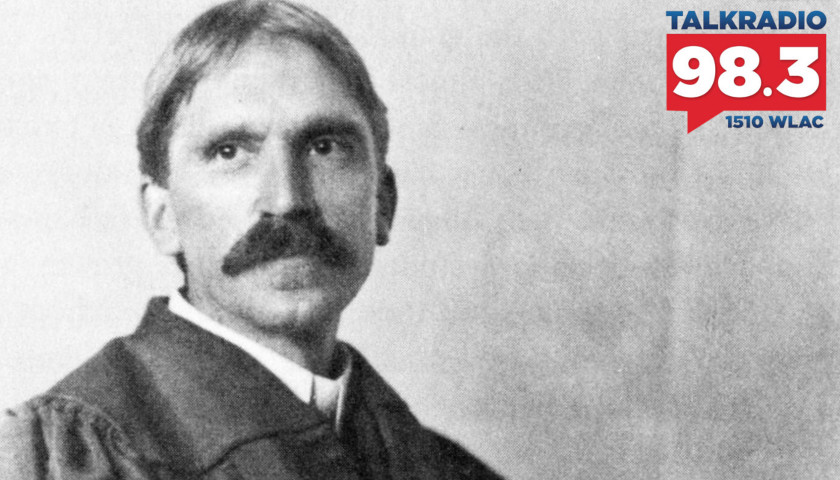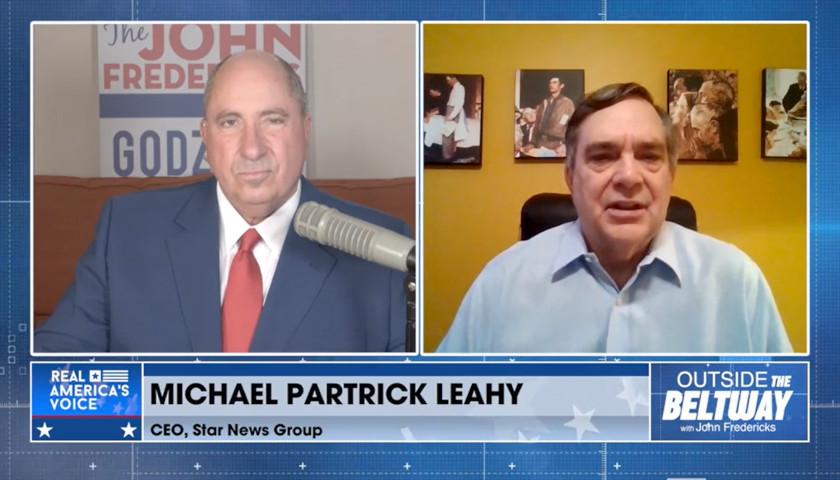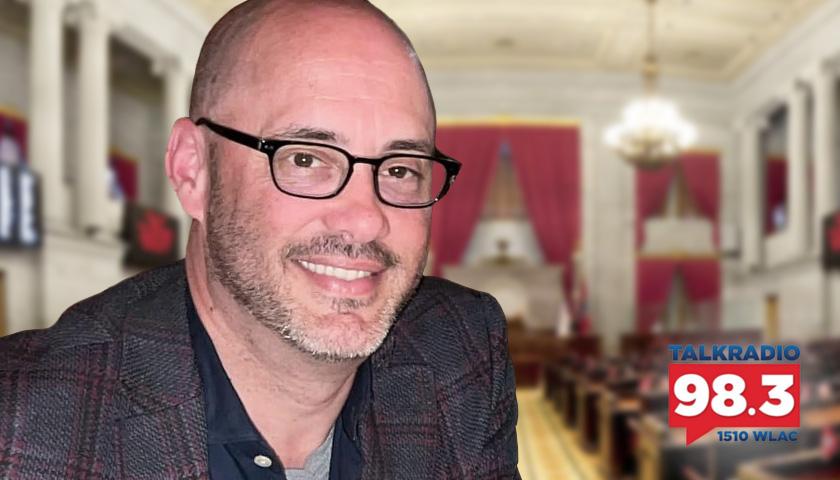In an exclusive interview Friday morning on The Tennessee Star Report with Michael Patrick Leahy – broadcast on Nashville’s Talk Radio 98.3 and 1510 WLAC weekdays from 5:00 am to 8:00 am – host Michael Patrick Leahy spoke with University of Dallas Professor of political science, Tiffany Jones Miller about her article entitled John Dewey and the Philosophical Refounding of America and the inspiration behind it.
During the show, Miller and Leahy discussed the influence of John Dewey and the progressives and ultimately the reversing idea of the founding of America and its influence on public education.
Leahy: We are joined now by Professor Tiffany Jones Miller. Professor of political science at the University of Dallas. It’s very important to have Professor Miller on. I was looking to see if there were any academics written critically about John Dewey. I am not a big fan of John Dewey. My personal feeling is that he and the progressives have ruined K-12 education here in the United States.
And I saw this really spectacularly good article written by Professor Miller in 2009. John Dewey and the Philosophical Refounding of America. And it was just so on point, I had to find her and ask her to come on the program. So here she is, Professor Miller thanks for joining us.
Miller: Well thank you. I appreciate the kind words and I appreciate the opportunity to talk to you.
Leahy: So you are, I think intellectually brave in the sense that you are one of the few academics that have pointed out the flaws in John Dewey’s philosophy as they’ve been translated to public education here in America. I think you’ve gone on just beyond John Dewey. Tell us a little bit about your work in that area and the influence that John Dewey and the progressives have had on K-12 education in America.
Miller: I guess I would begin by saying that I wasn’t particularly focused on John Dewey and education. I began my work on Dewey which really turned into a much broader project on the earlier progressive movement to tried to figure as many Americans are trying to figure out what happened to our country.
Leahy: Yes! Professor Miller, that is the question of the day for everyone in our listening audience. What happened to our country? That’s a great question. What’s the answer?
Miller: So, specifically what I wanted to try to figure out was as a student I had been taught the principles of the American founding and the American founders concerned for the natural rights of the individual and hence the consent of the individual being the source of the power of government and the rights of the individual limiting the powers of government.
Then I was asked to teach a course on 20th century America (Chuckles) and asked to deal with the reality of what our government has become. Both in terms of it’s intervention in American life as well as the way we make policy any more which is administratively. And so I thought that there was a pretty direct answer to that question and that that was to be found in the turn of the 20th-century progressives and John Dewey as a signal part of that.
A leading part of that movement. And I think that’s true but I don’t think that’s the whole story any more. But in fact, the earlier progressives where self consciously repudiating the founding principles. The principles of the declaration of independence and the principles that guided the founders and their establishing and hopefully carrying that forward that vision of government into the future.
And they were very clear about this. And they were replacing it with a conception of government that they originally were willing to call socialism. It’s what I would call a non-Marxist understanding of socialism. It entails the primacy of government over the lives of the individuals. The purpose of the government to direct individuals to their highest development or their highest perfection.
They use that word a lot. And Dewey’s role in this, he was not only a very prolific academic but was also involved in a whole host of the founding of advocacy organizations to carry forward this vision. But he approached education as part and parcel of this larger social transformation that he wanted to affect politically. So his educational philosophy was a subordinate part of this larger social transformation he wanted to make in the country.
Leahy: Wow. And by the way, your background is I see that you went to the University of California at Davis. Are you a native of California?
Miller: Yes. I am a native Californian. If you’re from California that used to be a joke but it’s actually true.
Leahy: See again, this is individual thought on your side. How does somebody who grew up in California come to such logical conclusions that are counter to almost all of academia?
Miller: I wouldn’t say the course of research I’ve pursued is the most advantageous in academia that’s for sure. But honestly, it was the consequence of running into the political science department that I ended up studying as an undergrad. And that was really quite by chance. It was the nearest state university to my home and it had a handful of scholars who were deeply interested in recovering the American founding. So I started to learn about the founding.
Leahy: So you have a new book project coming out. Are you elaborating on that in more detail?
Miller: As I said, my interest in the earlier progressives started with John Dewey. Now, this is something that I’ve been working on for 15 or so years. What I wanted to do was in order to show that the very new ideas that you find in John Dewey’s thought about what is the proper relationship between the individual and his government.
And what is the proper role of government in bringing that about. What I wanted to do was be able to tie those ideas, those radical new ideas to actual policy change and institutional change. And that’s a little hard to do with Dewey, apart from the field of education his influence is kind of diffused.
So I kind of shifted my attention to the other progressive academics, in particular, the economists who were just intimately involved with again this kind of signature policy change that led to the administrative state on the one hand and the growth of government on the other.
Leahy: And one of those economists was Richard E. Lee?
Miller: Richard T. E. Lee
Leahy: By the way, he is originally from Ripley in Chautauqua County New York.
Miller: That’s right.
Leahy: Up where I’m from. Do you know who else is from Chautauqua County? Rex Tugwell.
Miller: That’s right.
Leahy: Who was from Sinclairville in Chautauqua County, New York and is the big new deal economist. I don’t know what’s going wrong with those guys up there. (Laughs)
Miller: Both of those guys in terms of explaining who the economists were, many of the progressive academics were trained in Germany. They were born and raised in America. Had their education up to the undergraduate level in America.
And then went abroad to get what was at the time kind of a new credential, higher education, a Ph.D. And many of them ended up in German schools. The influence of German thought was profound.
Leahy: Now is it mostly the philosopher Hegel who had the idea of this historical dialectic of perfectability of man that we’re always moving to that level of perfection? Is that really what kind of influenced them?
Miller: Yes. And you can see that as it’s very clear. Dewey himself was not German-trained. But he trained with a bunch of German trained scholars at Johns Hopkins.
Leahy: Ok, let’s just stop for a moment. Johns Hopkins when he was there was also where Wildrow Wilson was the leading progressive right?
Miller: Woodrow Wilson, yes. Dewey was there at the same time as Wildrow Wilson. And there are a number of other very important progressive reformers whose names we have forgotten. Like Ealey. Ealey was a very young assistant professor at Johns Hopkins and he was Wildrow Wilson’s teacher.
As well as John R. Commons is one of these names we’ve forgotten. But John R Commons has been credited by some and not unreasonably as being the father of the welfare state in America. And Commons was basically Ealey’s student and followed Ealey when he left John Hopkins to go up to the University of Wisconsin-Madison.
Leahy: Oh, now there’s a hotbed of liberalism. (Laughs)
Miller: Right. If you have any kind of notion of the earlier progressives reform and which states were kind of leading the way Wisconsin was at the heart of it.
Leahy: And La Follette was the political arm of it in the 20s.
Miller: That’s right. And was the governor. He was the founder in effect the progressive wing of the Republican party in Wisconsin. And he took over the Republican party when he became Governor. And he had his own, you’ve heard the term, ‘brain trust’ with a whole host of academics to plan his… (Inaudible talk)
Leahy: Do you have a publisher for your book? When is it coming out? Do you have a name for it?
Miller: I do not.
Leahy: You’re looking for a publisher. OK. On the air, I will tell you. Star News Digital Media. If you don’t find anybody else, we’ll publish your book.
You can listen to the full interview in the second hour of Friday’s program here:
– – –
Tune in weekdays from 5:00 – 8:00 am to the Tennessee Star Report with Michael Patrick Leahy on Talk Radio 98.3 FM WLAC 1510. Listen online at iHeart Radio.








